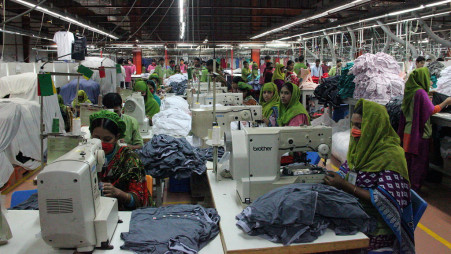22 factories still closed in Ashulia industrial zone

Twenty-two factories are still closed today (19 September) in Dhaka's Ashulia industrial zone amid the labour unrest going on for the past two weeks.
According to the Industrial Police, except for 22 factories, all other factories in the area are operational, and workers are actively working.
Since the beginning of this week, the situation in the industrial area has been gradually stabilising.
However, workers at several factories, including Medlar, Setara, and Bando Apparels, have stopped work due to various demands.
Discussions are ongoing to resolve the issues, sources said.
Industrial police, industry insiders, and labour leaders have expressed hope that the current stable situation will continue and that the area will soon be buzzing with activity again.
At around 10:30am, Superintendent of Industrial Police-1, Md Sarwar Alam, told The Business Standard, "So far, the overall situation remains normal. Operations are ongoing in all factories, including Ha-Meem and Sharmin, and workers are working."
"In addition to this, under Section 13(1) of the Bangladesh Labor Act 2006, 16 factories are closed, and 6 factories are on general leave," he added.
However, according to BGMEA sources, production activities are suspended in 20 factories in Ashulia today. Among them, 12 factories are closed under Section 13(1) of the Bangladesh Labor Act 2006, while 8 factories have been shut down due to work stoppages or because workers have left.
The factories closed under Section 13(1) of the Labor Act include Radiance Fashion, Radiance Jeans, Comfit Composite Limited, Tech Max, Shin Shin Apparels, Pearl Garments, Generation Next, and several others.
He also mentioned that members of law enforcement agencies are deployed in front of various factories to ensure security in the industrial zone, and joint forces are continuing patrols.
According to industrial police sources, discussions with factory owners and the BGMEA are ongoing to reopen the factories that are still closed in the region.
"Workers are eager to return to work, and the reason for the commotion in front of the closed factories is that workers want to resume their jobs. Once the factories reopen, the minor issues can also be resolved through discussions," said industrial police sources.
The sources further said the labour leaders are also echoing similar sentiments.
"They are saying that since the situation has improved, keeping a few factories closed will not solve the problems; rather, it may affect other factories where the situation is normal. Therefore, they are urging for the factories to be reopened and issues to be resolved through dialogue," added industrial police.
Khayrul Mamun Mintu, legal secretary of the Bangladesh Garments and Sweater Workers Trade Union, said that workers are eager to work, and since the situation has improved, most factories have reopened. He urged the owners of the closed factories to reopen them quickly, discuss with the workers, and resolve the issues through negotiation. Keeping the factories closed is not a solution.
He added, "If the owners fail to resolve the issues by discussing with the workers in the improved environment we have now, that will be a failure on their part."
It is worth noting that there are 1,863 factories under the jurisdiction of Ashulia Industrial Police-1, the majority of which are garment factories.


 Keep updated, follow The Business Standard's Google news channel
Keep updated, follow The Business Standard's Google news channel
















